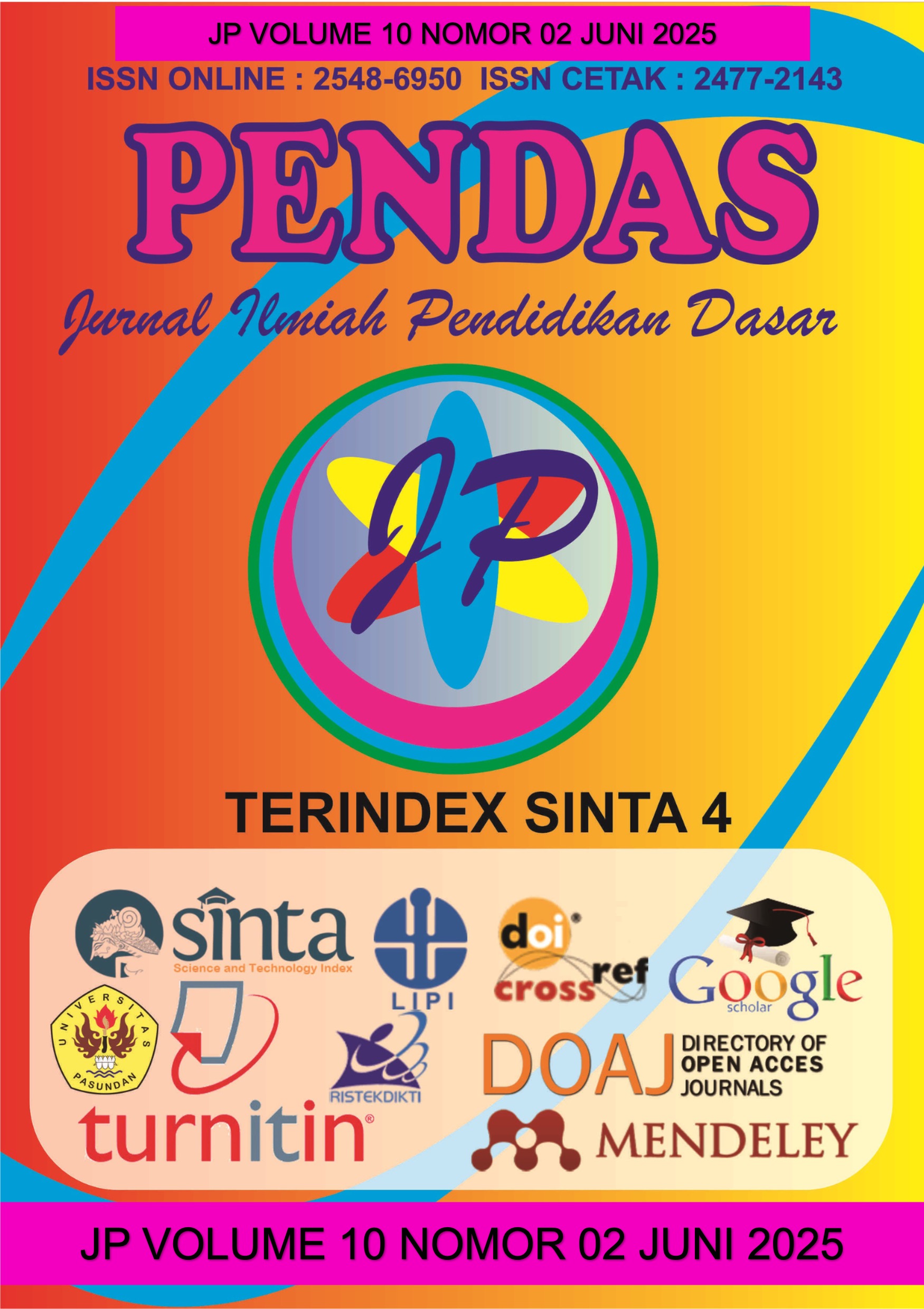MENGINTEGRASIKAN OLTRAD EGRANG DALAM PEMBELAJARAN BERBASIS PROYEK UNTUK MENINGKATKAN KESADARAN BUDAYA BAGI SISWA KELAS IV SDN 001 BARONG TONGKOK
DOI:
https://doi.org/10.23969/jp.v10i02.25193Keywords:
Project-Based Learning, Traditional Games, Local WisdomAbstract
This study aims to develop and implement a Project-Based Learning (PjBL) model in the teaching of Science and Social Studies (IPAS) for Grade IV students at elementary school, incorporating the theme of local wisdom through the traditional game egrang. The learning model is designed to increase students’ active participation, foster a love for local culture, and develop motor skills and teamwork through contextual and enjoyable activities. The research employs a Classroom Action Research (CAR) method conducted in three cycles at SD Negeri 001 Barong Tongkok, Kutai Barat Regency, involving 27 students (15 boys and 12 girls). The PJBL implementation followed six stages: (1) formulating essential questions, (2) collaboratively designing the project, (3) practicing the egrang game directly in the field, (4) monitoring and guiding students throughout the project, (5) evaluating the learning process and outcomes, and (6) presenting the project results through demonstrations. Learning resources included a Grade IV IPAS textbook and educational videos from YouTube projected using an LCD projector. Assessment was conducted both formatively and summatively. The results showed that implementing the PJBL model through direct practice was highly effective. Out of 27 students, 24 demonstrated significant improvement in motor skills, courage, and understanding of local culture. Although 3 students still required additional assistance in mastering basic egrang techniques, they showed positive progress throughout the learning process. In conclusion, the direct-practice-based PJBL model is highly suitable for IPAS learning with a local wisdom theme. It is recommended that egrang activities be integrated into national celebration events such as Independence Day (August 17th), Youth Pledge Day, or Cultural Day, to encourage ongoing student participation and support the preservation of traditional games as part of national cultural heritage.
Downloads
References
Agustin, M., & Syaodih, E. (2008). Bimbingan konseling untuk anak usia dini. Jakarta: Universitas Terbuka.
Brabender, V., & Fallon, A. (2009). Group development in practice: Guidance for clinicians and researchers on stages and dynamics of change. Washington, DC: American Psychological Association.
Latip, A. D. A., & Supriatna, A. (2023). Strategi project based learning berbasis STEM dalam memotivasi siswa aktif dan kreatif. Widina Media Utama.
Lestari, S., & Yuwono, A. A. (2022). Coaching untuk meningkatkan kemampuan guru dalam menerapkan pembelajaran berbasis proyek (Project Based Learning). Kun Fayakun.
Sahril. (2022). Peningkatan hasil belajar peserta didik dalam penerapan model Problem Based Learning di MAS Darul Istiqamah Manado. MAS Darul Istiqamah.
Azani Putri, G. A. B., Asrin, A., Fauzi, A., & Syazali, M. (2024). Pengembangan multimedia interaktif berbasis kearifan lokal Sasak pada pembelajaran IPAS. Journal of Classroom Action Research, 6(4), 792–799.
Firmansyah, R. (2019). Pengaruh model blended learning terhadap hasil belajar. Jurnal Teknologi Pendidikan, 5(1), 34–42.
Handayani, T. (2021). Project based learning dalam meningkatkan kreativitas siswa. Jurnal Kreativitas Pendidikan, 3(1), 45–54.
Lestari, M. (2020). Efektivitas model TPS dalam pembelajaran tematik. Jurnal Pendidikan Dasar, 8(1), 55–63.
Nuraini, D. (2023). Penggunaan media interaktif berbasis ICT dalam pembelajaran. Jurnal Teknologi Pendidikan Anak, 4(2), 101–110.
Prasetyo, H. (2018). Model mind mapping untuk meningkatkan daya ingat. Jurnal Psikologi Pendidikan, 9(3), 76–84.
Pristy, N., & Sukartono. (2023). Kontribusi media PowerPoint interaktif dan model problem based learning terhadap hasil belajar IPAS sekolah dasar. Jurnal Elementaria Edukasia, 6(4), 2026–2036.
Rahmawati, B. (2022). Penerapan discovery learning untuk meningkatkan literasi sains. Jurnal Pendidikan Sains SD, 7(3), 144–152.
Saputra, E. (2022). Penerapan flipped classroom pada pembelajaran matematika. Jurnal Inovasi Pembelajaran, 11(1), 20–30.
Susanto, A. (2021). Pengaruh model PBL terhadap hasil belajar IPA. Jurnal Inovasi Pendidikan, 10(2), 112–120.
Wahyuni, S. (2020). Implementasi model role play dalam pembelajaran IPS. Jurnal Pendidikan IPS, 6(2), 89–98.
Zahra, N. (2021). Pengaruh problem solving approach terhadap kemampuan berpikir kritis. Jurnal Pendidikan dan Pembelajaran, 7(3), 66–74.
Hodgson, J., & Weil, J. (2011). Commentary: How individual and profession-level factors influence discussion of disability in prenatal genetic counseling. Journal of Genetic Counseling, 20(1), 1–10.
Downloads
Published
Issue
Section
License
Copyright (c) 2025 Pendas : Jurnal Ilmiah Pendidikan Dasar

This work is licensed under a Creative Commons Attribution 4.0 International License.














































